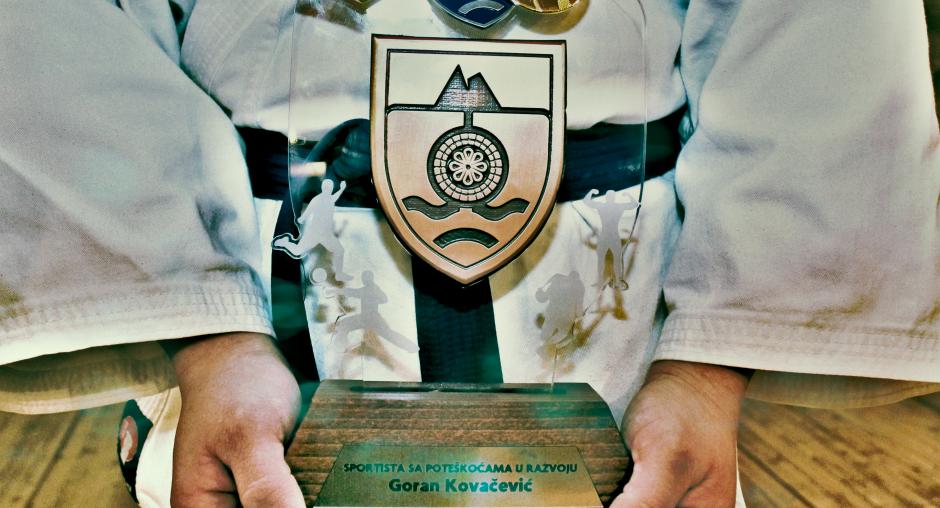No real gym, fancy equipment, a disability - A Ray of Hope for the winners
Goran Kovačević moved skilfully on the creaky wooden floor demonstrating the martial arts techniques he mastered, ten years ago, in the basement of the old culture centre in the small town of Foča.
A gold medal winner. A 2020 champion in para-karate for Bosnia and Herzegovina. No real gym, no tatami floor mats, no fancy fitness equipment to use to exercise. Born with Down syndrome and the strength of a hero.
A mother’s love
Goran trains with the other children and adults with disabilities, who are beneficiaries of “A Ray of Hope”, the local non-governmental organization and founder of the Service Centre
Founded by Jelena Vilotić, a mother who wanted to help her child and others with a disability, this unique facility provides psychosocial support and health care services for people with disabilities in the broader area of Foča and surrounding municipalities.
“I thought we were invisible,” says Jelena. “I couldn’t see any other family with children with disabilities on the streets of Foča, and there was really nothing I could offer my son.”
Encouraged by her friends, Jelena and another mother in the community decided to establish an NGO. ”That is how a Ray of Hope was born, for all people with disabilities,” says Jelena. “Just lots of love and determination.”
Centre of hope
An enthusiastic woman with a social entrepreneurial spirit, Jelena managed to use the resources available in the local community and connect people. The Centre became the teaching base of the University School of Medicine in Foča, and hosted student volunteers.
The Municipality of Foča provided the Centre with a small workspace free of charge, and soon Jelena realized that they were not alone.
“There were other families in Foča who needed support for children and adults with disabilities and soon after the Centre opened, they came out of the shadows,” she says.
Community in action
“At the beginning, we had only three families from Foča, but now we have 114 families from eight municipalities in Republika Srpska and the Federation of BiH: Bileća, Čajniče, Gacko, Goražde, Foča, Foča –Ustikolina, Ljubinje and Višegrad. Connected in hope and with the strength to succeed,” says Jelena.
Vladimir Blagovčanin, OSCE National Programme Officer, said that Jelena, with her brave move, unintentionally contributed to breaking the vicious cycle of the stigmatization of families of people with disabilities and their self-imposed exclusion from society. “They weren’t invisible anymore. Rights and services for their loved ones found their way into concrete measures,” said Vladimir.
The Centre has an expert team who provide individual and group psychosocial treatments for children and adults with disabilities.
“We also offer support to family members,” says Jelena. “Parents, and especially mothers, understand the other parents best, and the problems they are going through, and no one can fight for our children better then we can.”
OSCE’s support
“We at the OSCE Mission to BiH, strongly support human rights and the inclusion of people with disabilities in BiH society. We were amazed with the work done by Jelena and the whole community,” said Vladimir. “This initiative brought community together and bridged the gap between people living in different entities, by building mutual trust and advocating for equality of people with disabilities”.
"We launched an initiative with the local authorities to include the Centre into the municipal social protection system. However, their funding still needs to be permanently resolved" he explained.
“We negotiated with the Municipality of Foča to increase the monthly instalments to the Centre in order to improve the quality of service. The Mission initially covered the costs of transportation for children from other municipalities in both Republika Srpska and the Federation of BiH, which enable them to be involved in treatments provided by the Centre,” said Vladimir.
After initial support, the Mission is no longer directly supporting the Centre, but continues to co-operate, by involving Jelena and the Centres’ team as experts who could share their experience and knowledge with the other peers and NGOs for people with disabilities in the region.
Vladimir noted that: “This year, the OSCE Mission will support capacity building and assist the networking among associations of people with disabilities and introduce the Centre as positive example of NGO with advanced know-how, technical capacity and knowledge that could transfer its experience to other organisations.
According to the results of the 2013 Census, almost 300,000 (8.33 per cent) out of 3.5 million people in BiH have a certain degree of disability.Every municipality in the country should have a services centre to provide full support to people with disabilities and their families.
Jelena Vilotić
Challenges for “A Ray of Hope”
“Financial sustainability still remains our biggest challenge,” says Jelena.
The Centre succeeded to get financial support from several international donors and ad-hoc funding from local authorities in Foča, but it needs continuous funding as well as a larger facility to help more families.
“Imagine a bigger and sustainable Centre that would enable people with disabilities to show their abilities in a way Goran did on his path to the BiH champ,” says Jelena. She envisaged a project to build a new facility with the participation of the municipality, which could provide free construction land and infrastructure.
Goran is now a member of the national team and a potential candidate for the 16th Summer Paralympic Games that will be organised in Tokyo, Japan, and he may travel toward the Land of the Rising Sun in 2021.
“Goran’s success and the Centre’s achievements have opened the door for many others. However, they need stronger financial and material support from local authorities and communities,” says Vladimir. “They brought hope to many. Each of us can play a role no matter how big or small,” he says.

